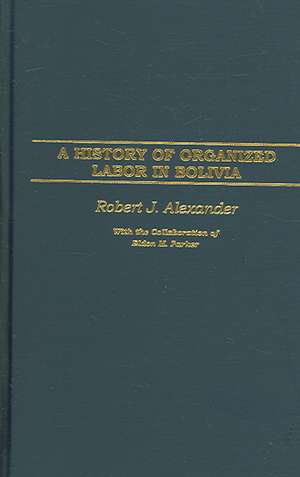A History of Organized Labor in Bolivia
Autor Robert J. Alexanderen Limba Engleză Hardback – 29 noi 2005 – vârsta până la 17 ani
Preț: 497.06 lei
Preț vechi: 688.30 lei
-28% Nou
Puncte Express: 746
Preț estimativ în valută:
95.11€ • 99.56$ • 79.16£
95.11€ • 99.56$ • 79.16£
Carte tipărită la comandă
Livrare economică 31 martie-14 aprilie
Preluare comenzi: 021 569.72.76
Specificații
ISBN-13: 9780275977443
ISBN-10: 0275977447
Pagini: 212
Dimensiuni: 156 x 235 x 22 mm
Greutate: 0.45 kg
Editura: Bloomsbury Publishing
Colecția Praeger
Locul publicării:New York, United States
ISBN-10: 0275977447
Pagini: 212
Dimensiuni: 156 x 235 x 22 mm
Greutate: 0.45 kg
Editura: Bloomsbury Publishing
Colecția Praeger
Locul publicării:New York, United States
Notă biografică
Robert J. Alexander is Professor Emeritus of Economics and Political Science, Rutgers University. He was a member of John F. Kennedy's Task Force on Latin America where the Alliance for Progress was developed, and he is a former consultant to the American Federation of Labor and the AFL-CIO on Latin American and Caribbean organized labor. One of the country's most respected scholars of Latin American politics and economic affairs, Professor Alexander is the author or editor of forty-five earlier books, most of them focusing on Latin America and the Caribbean, including The Bolivian National Revolution, the first English-language study of that upheaval, and the history of labor and radical movements.
Cuprins
PrefaceIntroductionBolivian Organized Labor Before the Chaco WarUnionism From the Chaco War to the Bolivian RevolutionOrganized Labor During the Bolivian National RevolutionOrganized Labor After the Bolivian National RevolutionBibliographyIndex
Recenzii
The author uses his own experience as a participant-observer since the 1940s to construct an intimate portrait of labor politics; Alexander is especially good at analyzing the various left-of-center political parties in Bolivia. In the bibliography, the author lists interviews with 87 different individuals conducted over five decades. This source material lends the book its unique insider perspective. In addition to the personal feel of Alexander's narrative, the text makes a unique contribution by placing pivotal events into an international context..The interviews collected over a lifetime of research in Latin America are the praise-worthy bedrock of this work..Alexander uses this unique source material to good effect to remind scholars of the critical political role played by the Bolivian working class in the twentieth century.













